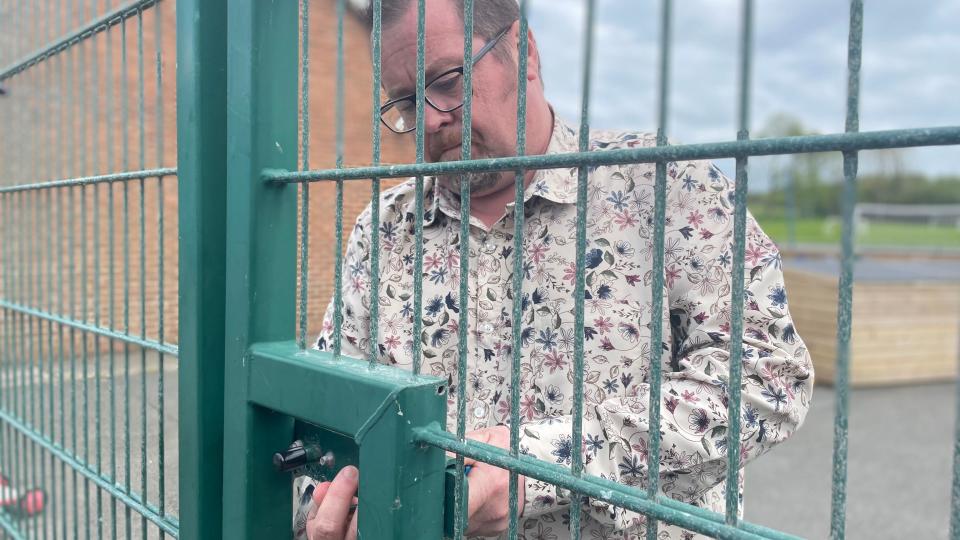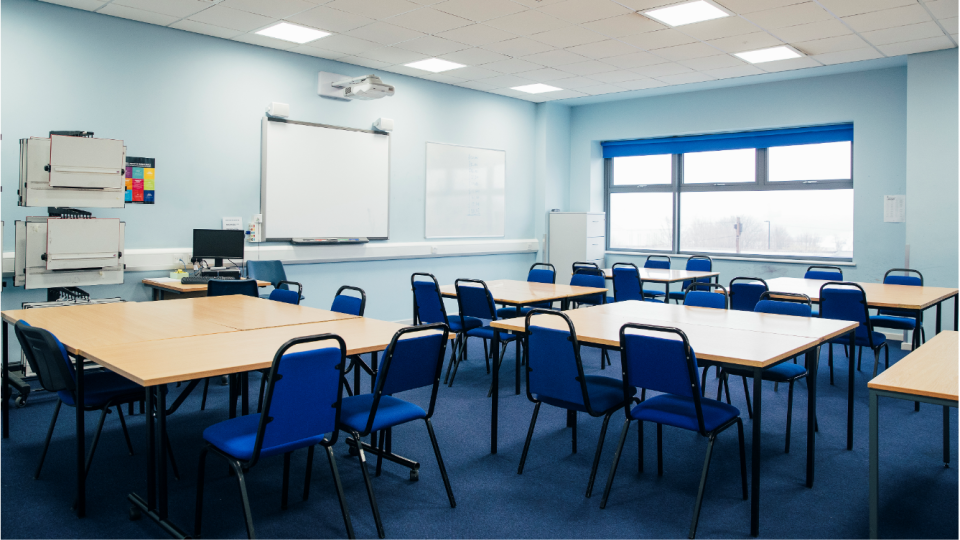Head teacher becomes school caretaker to save cash

A head teacher has been forced to moonlight as his school's caretaker in a bid to save money within its squeezed budget.
Gareth Lewis now sees to the day-to-day maintenance work, testing of fire alarms, and water hygiene at his primary school in Pembrokeshire, in addition to teaching and his other duties as its head.
His is one example of how schools in Wales are responding to the squeeze on budgets, while many others are cutting jobs.
The Welsh government - which is responsible for education in Wales - said its budget next year was £700m less in real terms than when it was set by the UK government in 2021.
Councils have confirmed to BBC Wales News that nearly 200 schools have been discussing redundancies in 2024, with the full figure likely to be far higher.
Mr Lewis has been headteacher of Broad Haven Primary School for eight years, and took up caretaking duties at the start of 2023 when the previous caretaker left.
He starts his day by opening up the 101-pupil school, and stays until the after-school club has ended to close the gates.

Mr Lewis also teaches pupils for two days a week, but he decided to double-up as caretaker to free up money for a classroom teacher.
“It’s frustrating, it’s tiring at times. But I’m happier that I’m able to employ a younger, a more energetic teacher than myself to give the children the education that they deserve," he said.
In previous years the school had to lose staff when their contracts came to an end, but this year transitional funding from the local authority meant job losses were avoided.
As well as site security, Mr Lewis is responsible for "alarm testing, the sprinkler pump testing, the legionella testing and day-to-day maintenance of the school".
Parents sometimes help out in "bring-your-tools-to-school days".
Schools cutting staff
Elsewhere, many schools have been consulting about redundancies.
BBC Wales News asked all of Wales' 22 councils how many schools had been looking at voluntary redundancies so far in 2024.
Some, including Cardiff and Swansea, said they could not give the information, but the total from 17 councils was around 200.
The numbers ranged from one school in Newport and Torfaen to 28 in Rhondda Cynon Taf.
Powys council said 21 schools had "active management of change processes" .
"Not all of these will result in redundancies, some schools are consulting on reductions in hours or reductions in grades of posts", a Powys council spokesperson said.
On whether compulsory redundancies would be necessary, many said it was too early to say.
But Wrexham said there was the potential for seven or eight, and Gwynedd and Flintshire both said four posts had been identified so far for compulsory redundancy.

Mum-of-three Lorraine Rigby said she has "sleepless nights" over how funding cuts could affect her eight-year-old son, who has additional learning needs related to a genetic condition.
He currently has extra support from teaching assistants, but Ms Rigby, who lives just outside Llandudno, is worried that squeezed budgets could impact that, leaving him "more isolated and less confident".
"It is really worrying because since we were made aware of it earlier in the year, it has created sleepless nights", she said.
"It's just become a day-to-day concern and not knowing what September is going to look like for the children at the school."
Fears of more exclusions
In many areas including Blaenau Gwent, Powys, Bridgend and Conwy, schools have written to parents highlighting the impact cuts could have on pupils' education.
A group of schools in disadvantaged areas across north Wales have also come together to share concerns about budgets.
The 11 schools fear that pastoral and wellbeing staff would bear the brunt of cuts, and that could lead to more exclusions and pupils being de-registered.
They said almost all members of the group had already lost their librarians because of the squeeze on budgets.

Head teachers' union NAHT Cymru said schools were "in crisis" and called for "urgent action" from the Welsh government.
Its national secretary Laura Doel said schools are having to "scale back the curriculum, and cut spending on everything from targeted support for pupils who need extra help, to equipment, energy and maintenance".
A Welsh government spokesperson said despite its budget for 2024-25 being £700m less than in 2021 it had protected the money for local government from which schools are funded.
"We understand the pressures schools are under", the spokesperson said.
"The amount of funding set aside for school budgets is for local authorities to determine and we will continue to work with the sector to ensure the best possible outcomes for our learners."
Conservative Member of the Senedd Tom Giffard said Labour had "overseen a decline in standards over their 25 years in charge", saying that for every £1.20 that it received for education it only spent £1.05.
“Labour’s record in Wales on education is a stark warning for the rest of the UK on what a Labour government will look like in Westminster."
Plaid Cymru's education spokesperson Heledd Fychan said "immense financial pressure" being felt by schools was affecting staff and pupils.
“Redundancies are being made, even though retaining and recruiting teachers and teaching assistants is getting increasingly more difficult; there’s a postcode lottery in relation to provision and support for learners with additional learning needs; the gap between learners from low income backgrounds and others is increasing, and absenteeism is still high. And these are only some of the problems," she said.


